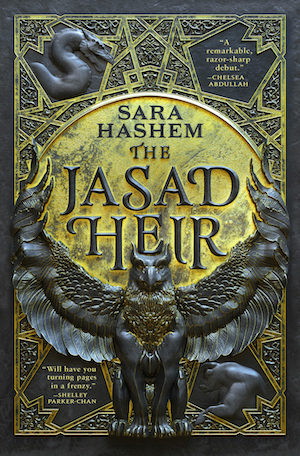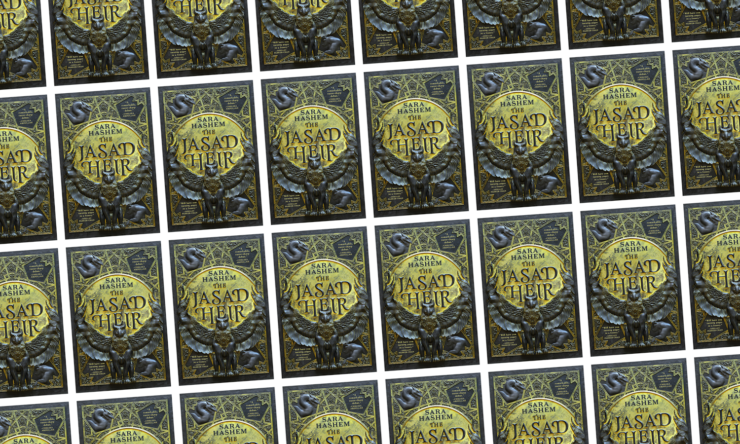The Jasad Heir is the first book in The Scorched Throne, a projected epic fantasy series. It’s the debut novel of Sara Hashem, an American-Egyptian from California. Like every book I read, I wanted to love it. But as with many a novel—particularly debut novels—I found myself more disappointed than satisfied. Some spoilers ahead.
The Jasad Heir is told almost entirely from the point of view of a young woman known as Sylvia. Sylvia’s birth name is Essiya, and she was born to inherit the kingdom of Jasad, one of five closely interlinked kingdoms: Omal, Orban, Lukub, Nizahl, and Jasad. These kingdoms appear to be very close together, and rather small, in geographic terms—indeed, it’s not clear that any other inhabited lands exist in this world—and they share a foundational mythology connected to magic and its dangers. Of all the five kingdoms, Jasad was the only one whose inhabitants still possessed innate magic. (Is their magic due to their environment, to inheritance, or to something more mythological? That’s a question The Jasad Heir never even begins to pose, though to me it seems that the circumstances rather beg for it to be asked.)
Buy the Book


The Jasad Heir
When Sylvia was ten, her family—the royal family of Jasad—was killed in an attack apparently orchestrated by the ruler of Nizahl. The kingdom was overthrown, and its people were slaughtered and scattered. To be a Jasadi, capable of magic of any kind, is a death sentence enforced by Nizahl and its soldiers, a state of affairs supported by the other three kingdoms.
Sylvia herself possesses magic, but for as long as she can remember she’s been unable to use it: It’s restrained by magical silver bracelets that only she can see, and that seem to nullify all magic that touches them. After the fall of Jasad, she fell into the hands of Hanim, an exiled former Jasadi military leader living deep within Essam Woods. This Hanim spent the next five years trying to “train” Sylvia/Essiya in letting out her magic so that she could take up the Jasadi cause. Hanim’s “training,” however, was little more than torture and abuse both physical and psychological allegedly directed at a goal. A regimen of abuse often backfires, and at the age of fifteen, Sylvia killed her tutor-tormentor, turned her back on all things Jasadi, and set out to make a new life for herself as an unremarkable orphan washed up on the edges of village life.
Now past twenty, she’s still under the protection of Raya, who takes in lots of orphans, and apprenticed to Rory, the village chemist, although her apprenticeship doesn’t appear to follow any traditional apprenticeship modes. Her fragile security is shattered when the royal heir to Omal deliberately injures a child in front of her, and she tries to kill him. This cements her as a person of interest to Arin, the Nizahli royal heir, who is also present. Arin is, at perhaps a handful of years older than Sylvia, a commander of legend and a famous hunter of Jasadi. Allegedly he can detect magic with a touch, making him especially dangerous to someone like Sylvia. But Arin has a use for her: He recruits her as a Champion using a combination of blandishments and threats, for he wants to use her to lay a trap for other Jasadi who have avoided being hunted down and killed. These other Jasadi are looking for Sylvia, for reasons Arin, at least, doesn’t yet know.
A Champion is a figure chosen yearly by the rulers of each of the kingdoms (or their heirs) to represent them in a series of competitive and often fatal trials. These trials celebrate elements from the kingdoms’ foundational myths. The victor becomes a prominent figure, rewarded and officially protected.
Sylvia is extremely angry about being compelled to do anything, especially by Arin, but Sylvia’s entire personality appears to be built around being angry, unhappy, and remarkably incapable of subtlety.
Arin repurposes an underground facility built by Jasadi during the reign of Sylvia’s grandparents for Sylvia’s training. Alone with Arin, a handful of his guards, and two hostages for her good behaviour—two people who act as her friends even though she has frequently rebuffed friendship—Sylvia’s limited ability to dissemble is thoroughly challenged. Especially as Arin knows about her magic from the first, and she can’t stop arguing with him. Her secrets, though not all of them, rapidly trickle through her fingers. Proximity, too, stirs Sylvia’s reluctant sympathy for, and understanding of, Arin. Despite the attitude of some of his guardsmen, it seems that Arin is one of the handful of Nizahli who don’t see Jasadi as dangerous monsters entirely by nature. His efforts have seen to it that some Jasadi at least survive their arrest, if not what follows it. Sylvia is horrified to find she’s becoming attracted to him.
Well, she tries to be horrified, anyway. Unfortunately, it seems, her protestations to the contrary, that her impulse control isn’t very good.
Told primarily in the first person from Sylvia’s point of view, The Jasad Heir has an appealing energy and an emotional vividness that will, I suspect, win over plenty of readers, particularly those drawn to the high emotional stakes and earnest, passionate sensibilities common in YA, of which it reminds me. The youthful heroine with a traumatic past and dark secrets, some secret even from herself, determined to live for herself alone but betrayed to selflessness by the human connections she can’t deny; the antagonist-hero, handsome and puissant, haunted by his failures and his overbearing father, cursed with a unique ability; a religious contest of strength, cunning, and survival; the fate of kingdoms hanging in the balance. It’s a winning combination.
Alas, for me, the reading experience is marred by a number of flaws. On a worldbuilding level, the kingdoms are defined by stereotypical traits: one a kingdom of luxury, one of parsimony taken to extremes, one a kingdom defined by military power, one by magic, and one that has little in the way of definition at all. The details of the ordinary world seem flat and implausible on a social and logistical level, although the occasional magical monster is vividly and colourfully described. Certain internal contradictions seem striking: The kingdoms appear to live largely in peace, with no external enemies, but Nizahl’s military force is famous and overwhelming, and one Jasadi character of recent history is mentioned having been a military commander who won many victories. Arin and Sylvia have very little chemistry beyond “I hate you” and “You frustrate me,” and the climactic kissing scene of their enemies-to-potential-lovers arc is one of the most unintentionally awkward I’ve read in the last few years . The challenges that Sylvia undertakes as a Champion are vivid and entertaining interludes, but the reasons for Arin to select Sylvia as his Champion rather than simply letting her be killed are… not entirely convincing.
I could write an extra piece of analysis about The Jasad Heir’s treatment of the devil’s bargain into which Arin traps Sylvia, Sylvia’s determination to claim most of her actions as her own unforced choices, the ethics of collaboration with (apparently) genocidal regimes, and the problems inherent in depicting the attraction between them with the history between their respective peoples, but to be honest with you, I found too many of Sylvia’s choices in the narrative beyond my understanding. I couldn’t do it with appropriate sympathy.
Too frequently, it seems to me, Hashem chooses to offer the most dramatic scene or sequence, the most energetically dramatic conflict or location, where in some cases a more subdued, matter-of-fact approach would produce more striking effects. As with acting, sometimes less is more. (Tell all the truth but tell it slant —)
It may well be that I’m jaded. Certainly it seems that other reviewers found more to love here than I did, including Arley Sorg, whose opinions I respect highly, in a review for Lightspeed Magazine. I imagine you should make up your own mind on that front.
The Jasad Heir is published by Orbit Books.
Liz Bourke is a cranky queer person who reads books. She holds a Ph.D in Classics from Trinity College, Dublin. Her first book, Sleeping With Monsters, a collection of reviews and criticism, was published in 2017 by Aqueduct Press. It was a finalist for the 2018 Locus Awards and was nominated for a 2018 Hugo Award in Best Related Work. She was a finalist for the inaugural 2020 Ignyte Critic Award, and has also been a finalist for the BSFA nonfiction award. She lives in Ireland with an insomniac toddler, her wife, and their two very put-upon cats.










